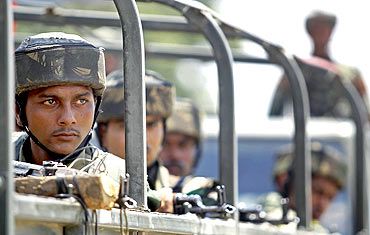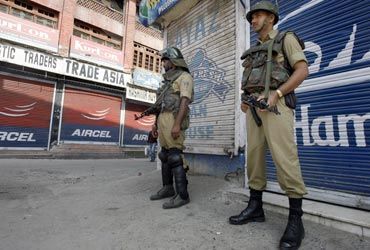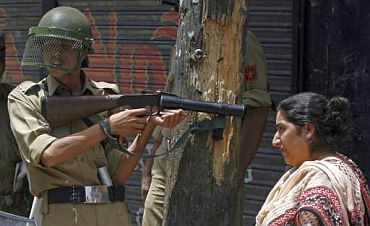
The Centre plans to withdraw nearly 10,000 paramilitary personnel from Jammu and Kashmir this year as it feels that the state can do with less central forces.
The government has also stated that amendments to the Armed Forces Special Powers Act (AFSPA) are still on the table and hopes the committee of the Unified Headquarters in the state declares some areas in the state as "not disturbed" to make the controversial law redundant in those parts.
"There is scope of reduction of troops is the Home Ministry's view. There are more than adequate forces in Kashmir and it can do with less central forces," Union Home Secretary G K Pillai said.
...

When asked how many personnel are being pulled out from the state, he said in 2009, the Centre pulled out 10 battalions (10,000 men) from the state. Last year, it did not take out any because of the agitation from June to September.
"I think this year, we can easily take out 10 battalions if not more. Irrespective of the situation, I can take out 10 battalions and it would not have any impact.
"We have about 70 battalions in Kashmir and we have 62 battalions in seven Left-wing affected states which are big states.... I think if I can take out, I will try to pull out as many as I can," he said.

On the amendments on AFSPA, whose withdrawal has been demanded by the state, he said this is an issue, which has to be decided politically.
"But OK, even if it is not done I think you can move forward and say some parts of Kashmir need not be declared disturbed," he said.
Pillai said that if there was no change being made in the AFSPA then the area can be denotified (as disturbed) and the law will not be applicable there.

"You keep the act as it is which is what the Army says don't meddle with the Act but if you want me (Army) to act, I need that Act... You see law and order situation in Srinagar has improved. Anyway, Army is not in Srinagar. They are not operating in Budgam.
"You say remove it from there.... That area is no longer disturbed. This is a notification of the state government not a state notification by Central Government," the Home Secretary said.
He said the proposals for amendments in the AFSPA were before the Cabinet Committee on Security.

The Home Secretary allayed fears that violence may return in the Kashmir Valley, saying several major steps have been taken post-September last year.
"All-party meeting, interlocutors, two reports of the Task Force of Jammu and Kashmir, Jammu and Ladakh reports have come. We got this employment committee report of Dr Ranjarajan that is expected this month. I think a lot of things are slowly changing. It is not fast enough as we would like," he said.
Pillai said there was a need to reach out to people of Kashmir and not just reaching out to mainstream political parties.

"I have seen many of these conferences... same old fifteen fellows in the last ten years in backstage, stage two.. same people, same thing coming out. You have to start talking to other people and get fresh ideas. So I think we have to reach out to the people of Kashmir," Pillai said.
He said the Centre is planning to hold seminars in remote areas of the state with a team of 100 officers of the Centre along with state government officers listening to the problems of local Kashmiris.
When asked whether this move will not impinge on the authority of the state government, he said the state government will be on board and the location will be selected by them.
"We don't have any Panchayati Raj in Jammu and Kashmir. You don't have any panchayats in Jammu and Kashmir for last couple of years.. so again people don't have any...local small problems..health problem, water problem, school problems, they don't have anybody to go except state government. These types of district seminars come to say they have a lot of opportunities," he said.
The Home Secretary said that in many remote areas, people do not know whom to contact.
"You will be surprised that most of people still come to me from distant districts in North Eastern areas because I held such seminars there," he said.